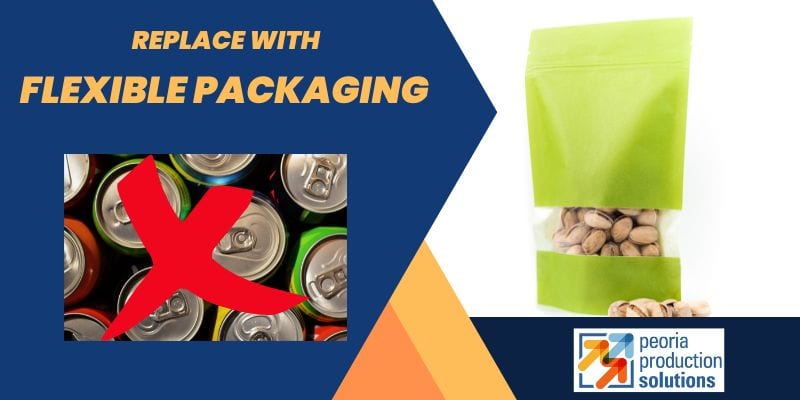
There are several reasons why flexible packaging replacing aluminum cans across a broad range of industries, such as food products, consumer goods, electronics, and cosmetics. Flexible packaging increases marketability and adds value to both food and non-food products, providing protective packaging properties with durable, flexible materials, including films, plastics, foils, and paper.
Some of the most important reasons that are driving the change from cans to flexible packaging include:
- Sustainability
- Advancements in flexible film technology
- Flexibility, versatility, and customizable
- Protects shelf-stable products
- BPA free
- Safety
Sustainability
Sustainability is a big plus for flexible packaging and one of the largest reasons for the increase in companies making the switch from rigid to flex packaging materials. Flex packaging provides a sustainable alternative with a comparable shelf life as cans yet can save up to 75% of material costs. Flex packaging requires considerably fewer materials, less fuel for production and transportation, and takes up less waste in landfills, although it is typically completely recyclable.
Flex packaging provides a green solution to the packaging industry, increases a company’s reputation for showing corporate responsibility, and significantly reduces the carbon footprint related to packaging. Sustainability is at the top of the list for the advantages of flexible packaging.
Advancements in Flexible Film Technology
Significant breakthroughs in flexible film packaging technology have improved the durability and resilience of flexible packages with high barrier protection and resistance to water, air, or spoilage.
Flexible Packaging Is Versatile and Customizable
Flexible packaging is highly versatile and customizable, with a variety of materials available in just about any size required. This significantly reduces extra space required for shipping and storing, as flexible packaging adjusts to the contours of the products to optimize space. Flexible packaging can include printing, stickers, tamper-resistant seals, and a variety of customizable designs and features.
Flex Packaging Protects Shelf Stable Products
High-barrier flexible packaging films are strong and durable enough to store shelf-stable food products without requiring refrigeration or freezing. These products in the past were stored in rigid containers for long-lasting protection.
Most Flexible Packaging is BPA Free
Bisphenol A, BPA, is a chemical that is commonly found in food packaging made of epoxy resins and polycarbonate plastics. BPA is found in polycarbonate plastics in beverage containers such as water bottles and in epoxy resins which are used to line the interior of metal food cans and bottle tops. According to the Mayo Clinic, some research shows that BPA can seep into food and beverages from storage containers and cause possible adverse health effects.
The FDA, however, has determined BPA is safe at very low levels. You can reduce your exposure to BPA by using BPA-free packaging products such as the many types of flexible packaging options.
Safety of Flexible Packaging
gone are the days of requiring employees to open large metal cans to expose a lid with very sharp edges. Safely handling and disposing of food and beverage containers is always a concern for food service operators. Grocery stores, restaurants, and food supply chains can lessen the risk to their employees for on-the-job injuries and cuts, which may cause Workmen’s Comp. claims and create blood-borne pathogen contamination issues as well. Flexible pouches designed with friendlier open and close features like tear notches and slide-to-close features significantly help to reduce injury rates in the food service industry and speed operations with easy open access.
Peoria Production Solutions, PPS, can help you realize the many benefits of flexible packaging as an experienced contract packaging and flex packaging provider. We provide high-quality flex packaging, auto bagging, heat sealing, auto labeling, and more with modern equipment and a highly trained staff. Contact us to learn more and realize the benefits of switching from rigid cans to flexible packaging.
